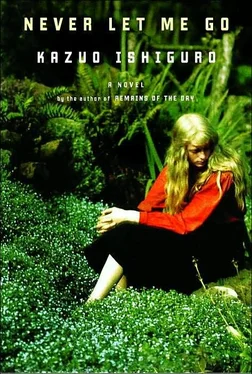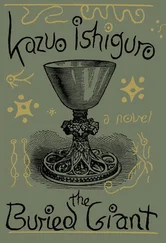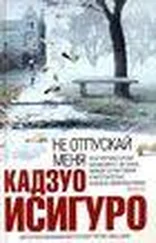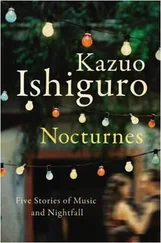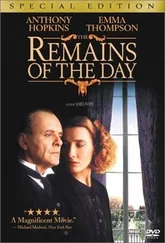“You’ve got a point, Kathy. It’s not nice. But if he wants it to stop, he’s got to change his own attitude. He didn’t have a thing for the Spring Exchange. And has he got anything for next month? I bet he hasn’t.”
I should explain a bit here about the Exchanges we had at Hailsham. Four times a year—spring, summer, autumn, winter—we had a kind of big exhibition-cum-sale of all the things we’d been creating in the three months since the last Exchange. Paintings, drawings, pottery; all sorts of “sculptures” made from whatever was the craze of the day—bashed-up cans, maybe, or bottle tops stuck onto cardboard. For each thing you put in, you were paid in Exchange Tokens—the guardians decided how many your particular masterpiece merited—and then on the day of the Exchange you went along with your tokens and “bought” the stuff you liked. The rule was you could only buy work done by students in your own year, but that still gave us plenty to choose from, since most of us could get pretty prolific over a three-month period.
Looking back now, I can see why the Exchanges became so important to us. For a start, they were our only means, aside from the Sales—the Sales were something else, which I’ll come to later—of building up a collection of personal possessions. If, say, you wanted to decorate the walls around your bed, or wanted something to carry around in your bag and place on your desk from room to room, then you could find it at the Exchange. I can see now, too, how the Exchanges had a more subtle effect on us all. If you think about it, being dependent on each other to produce the stuff that might become your private treasures—that’s bound to do things to your relationships. The Tommy business was typical. A lot of the time, how you were regarded at Hailsham, how much you were liked and respected, had to do with how good you were at “creating.”
Ruth and I often found ourselves remembering these things a few years ago, when I was caring for her down at the recovery centre in Dover.
“It’s all part of what made Hailsham so special,” she said once. “The way we were encouraged to value each other’s work.”
“True,” I said. “But sometimes, when I think about the Ex-changes now, a lot of it seems a bit odd. The poetry, for instance. I remember we were allowed to hand in poems, instead of a drawing or a painting. And the strange thing was, we all thought that was fine, we thought that made sense.”
“Why shouldn’t it? Poetry’s important.”
“But we’re talking about nine-year-old stuff, funny little lines, all misspelt, in exercise books. We’d spend our precious tokens on an exercise book full of that stuff rather than on something really nice for around our beds. If we were so keen on a person’s poetry, why didn’t we just borrow it and copy it down ourselves any old afternoon? But you remember how it was. An Exchange would come along and we’d be standing there torn between Susie K.’s poems and those giraffes Jackie used to make.”
“Jackie’s giraffes,” Ruth said with a laugh. “They were so beautiful. I used to have one.”
We were having this conversation on a fine summer evening, sitting out on the little balcony of her recovery room. It was a few months after her first donation, and now she was over the worst of it, I’d always time my evening visits so that we’d be able to spend a half hour or so out there, watching the sun go down over the rooftops. You could see lots of aerials and satellite dishes, and sometimes, right over in the distance, a glistening line that was the sea. I’d bring mineral water and biscuits, and we’d sit there talking about anything that came into our heads. The centre Ruth was in that time, it’s one of my favourites, and I wouldn’t mind at all if that’s where I ended up. The recovery rooms are small, but they’re well-designed and comfortable. Everything—the walls, the floor—has been done in gleaming white tiles, which the centre keeps so clean when you first go in it’s almost like entering a hall of mirrors. Of course, you don’t exactly see yourself reflected back loads of times, but you almost think you do. When you lift an arm, or when someone sits up in bed, you can feel this pale, shadowy movement all around you in the tiles. Anyway, Ruth’s room at that centre, it also had these big glass sliding panels, so she could easily see the outside from her bed. Even with her head on the pillow she’d see a big lot of sky, and if it was warm enough, she could get all the fresh air she wanted by stepping out onto the balcony. I loved visiting her there, loved those meandering talks we had, through the summer to the early autumn, sitting on that balcony together, talking about Hailsham, the Cottages, whatever else drifted into our thoughts.
“What I’m saying,” I went on, “is that when we were that age, when we were eleven, say, we really weren’t interested in each other’s poems at all. But remember, someone like Christy? Christy had this great reputation for poetry, and we all looked up to her for it. Even you, Ruth, you didn’t dare boss Christy around. All because we thought she was great at poetry. But we didn’t know a thing about poetry. We didn’t care about it. It’s strange.”
But Ruth didn’t get my point—or maybe she was deliberately avoiding it. Maybe she was determined to remember us all as more sophisticated than we were. Or maybe she could sense where my talk was leading, and didn’t want us to go that way. Anyway, she let out a long sigh and said:
“We all thought Christy’s poems were so good. But I wonder how they’d look to us now. I wish we had some here, I’d love to see what we’d think.” Then she laughed and said: “I have still got some poems by Peter B. But that was much later, when we were in Senior 4. I must have fancied him. I can’t think why else I’d have bought his poems. They’re just hysterically daft. Takes himself so seriously. But Christy, she was good, I remember she was. It’s funny, she went right off poems when she started her painting. And she was nowhere near as good at that.”
But let me get back to Tommy. What Ruth said that time in our dorm after lights-out, about how Tommy had brought all his problems on himself, probably summed up what most people at Hailsham thought at that time. But it was when she said what she did that it occurred to me, as I lay there, that this whole notion of his deliberately not trying was one that had been doing the rounds from as far back as the Juniors. And it came home to me, with a kind of chill, that Tommy had been going through what he’d been going through not just for weeks or months, but for years.
Tommy and I talked about all this not so long ago, and his own account of how his troubles began confirmed what I was thinking that night. According to him, it had all started one afternoon in one of Miss Geraldine’s art classes. Until that day, Tommy told me, he’d always quite enjoyed painting. But then that day in Miss Geraldine’s class, Tommy had done this particular watercolour—of an elephant standing in some tall grass—and that was what started it all off. He’d done it, he claimed, as a kind of joke. I quizzed him a lot on this point and I suspect the truth was that it was like a lot of things at that age: you don’t have any clear reason, you just do it. You do it because you think it might get a laugh, or because you want to see if it’ll cause a stir. And when you’re asked to explain it afterwards, it doesn’t seem to make any sense. We’ve all done things like that. Tommy didn’t quite put it this way, but I’m sure that’s how it happened.
Anyway, he did his elephant, which was exactly the sort of picture a kid three years younger might have done. It took him no more than twenty minutes and it got a laugh, sure enough, though not quite the sort he’d expected. Even so, it might not have led to anything—and this is a big irony, I suppose—if Miss Geraldine hadn’t been taking the class that day.
Читать дальше
